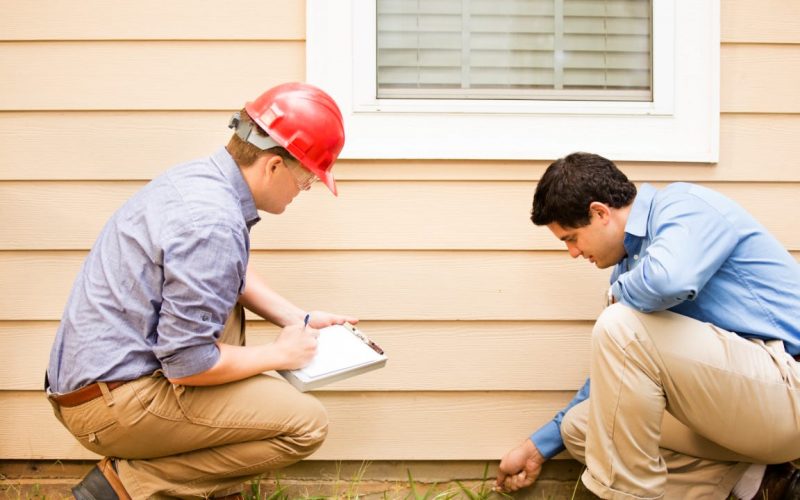Getting a professional home inspection is a crucial step in the house-buying process. Despite the fact that it is another cost in an already costly procedure, homeowners should never avoid it. Inspections can disclose issues with the property that the buyers may not have spotted or that the present homeowner is unaware of, thereby affecting the home’s final selling price. To aid you with the cost of a home inspection, how to choose the right home inspector, and all you need to know.
What Is a Home Inspection?
A home inspection is a complete evaluation of a home conducted by a skilled and licensed professional home inspector who will look for problems and possible problems.
They will inspect electrical and plumbing systems, HVAC components, safety features, windows and doors, insulation, and more, before providing a full report on the property’s current condition and potential future issues.
As a buyer, you can include an inspection contingency in your offer, which allows you to seek repairs or cancel based on the inspection report’s findings.
Do you need a home inspection?
A home inspection can protect you from costly surprises such as structural issues or concealed damage. While it is not required by law, buyers, particularly first-time homebuyers, might benefit greatly from having a professional inspect the property before committing to a purchase.
“Because a house purchase is such a huge commitment, maybe the greatest one a person will ever make,” says John Harris, broker/owner of ReMax Honolulu and president of Hawaii Realtors. “A little amount of money dedicated toward research now may save the homeowner substantial money in the future.”
A seller who is trying to sell a home may try to hide plumbing concerns or other flaws that could come back to haunt you later. It’s possible that sellers are unaware of defects in their properties that you don’t want to deal with.
“There is no ‘check engine light in a house.” According to Frank Lesh, ambassador for the American Society of Home Inspectors, “things may be incorrect that the homeowner or purchaser is honestly unaware of.”
How much does a home inspection cost?
The cost of a home inspection is determined by where you live, just as the contents of the inspection are determined by where you reside. The final price is influenced by market conditions, demand, and supply (in other words, the number of house inspectors in your community). Home inspections cost around $400 in Orr’s neighborhood, but most homeowners can expect to pay between $275 and $400 worldwide.
“Size, distance from inspector, price, and age of home are all elements that affect the pricing,” explains Nick Gromicko, founder of the International Association of Certified Home Inspectors.
It’s up to your inspector to decide how much they want to charge. Some companies offer a flat rate depending on square footage, such as $300 for a 2,000-square-foot home plus $25 for every 500 square feet over that. If one home has double the square footage of another you’ve placed an offer on, expect the larger home’s inspection report to be more expensive.
Read Also: SPECIAL WARRANTY DEED: Definition & How It Works (Texas & Florida)
Others may conduct additional research into the home’s age and condition before estimating a price. Older homes are more likely to have difficulties, such as faulty plumbing or an out-of-code electrical system, and an inspector may charge more to evaluate a 100-year-old home than they would for new construction. Because the inspector will have to spend more time in older residences, this is the case.
Inspections that are more specialized will increase the overall cost. Consider having these tests done if you or your agent detects the existence of any of these hazardous substances in the residence or suspected sewer issues. It could cost hundreds to tens of thousands of dollars to have them remediated.
- Lead testing: $250 to $350
- Mold testing: $600 to $800
- Radon testing: $90 to $200
- Sewer scope: $75 to $300
- Asbestos testing: $250 to $800
What’s the average cost of a home inspection?
The cost of a home inspection varies greatly depending on the region, as well as the size and age of the house.
Angie Hicks, the co-founder of the home services website Angie’s List, estimates that house inspections often cost between $300 and $450.
On a typical 2,000-square-foot property, Hicks estimates that a home inspection from a respectable business will cost at least $400. If you have a larger property or need additional inspections, such as mold or termites, which aren’t normally included, the price can easily rise to $500 or $600-plus.
The uniqueness of the home and the distance the inspector must travel to reach the residence are some factors that influence the cost of an inspection. Furthermore, house inspectors with greater experience may charge more than those with less.
What does a home inspection cost include?
The home inspector should do a thorough visual inspection of the property’s major structures and systems.
According to Harris, “[they] often contain a description of the four basic systems in a home structural and foundation, roofing, plumbing, and electrical as well as incorporated appliances and potential safety issues.”
#1. Checking for water intrusion in the home
One of the most serious worries would be signs of water inside the structure. “Water in the wrong spot can render a home uninhabitable. Mould could grow and wood could deteriorate as a result of a water leak, according to Lesh. “A steady roof leak could take years for the homeowner to notice, whereas a storm could generate a quick leak that anyone can see.” Inspectors will be able to tell you whether there have been any previous leaks.
#2. Reporting on the home’s roof condition
Home inspectors will assess the roof’s condition and look for any leaks. “It doesn’t matter if the roof is in good condition or not. “The inspector has no motive to uncover a problem or not,” Lesh explains. “Doing repairs on anything we check is against the ASHI Code of Ethics, so we just report what we see.”
#3. Inspecting electrical systems on the property
If electrical faults are identified early enough, they can be simple and affordable to remedy.
“However, an inexpensive repair may be fatal if not addressed right away,” Lesh warns.
Because a faulty ground fault circuit interrupter (GFCI) costs only approximately $10, many people believe it isn’t worth reporting. However, if a GFCI is not installed or is not working, electrical shock may result. Every accessible GFCI will be checked by home inspectors to ensure that it is working properly.
In general, according to the American Society of Home Inspectors, a complete home inspection report should cover these areas:
- Heating system
- Air conditioning system
- Plumbing
- Electrical system
- Roof
- Attic
- Visible insulation
- Walls
- Ceilings
- Floors
- Windows
- Doors
- Foundation
- Basement and structural components
What Does a Home Inspection Cost in Florida?
How much does it cost to get a home inspected? In Florida, the price of a home inspection typically ranges from $254 to $374, with the average price coming in at $302. This is for residences that are of average size. An inspection of a very large property could cost more than $1,000, whereas the cost of an inspection for a very tiny home could be on the lower end of the scale.
How Much is a Home Inspection in Missouri?
What Does the Average Cost of a Home Inspection Look Like in Missouri? In the state of Missouri, the price of a home inspection can range anywhere from $230.57 to $322.80, with the average price being $300. Prices can vary from one region to another, as well as depending on elements such as the age of the home and the square footage of the property.
What Fixes are Mandatory After a Home Inspection in Florida?
After a home inspection, technically speaking, you are not required to make any repairs to your property. Some homeowners even decide to sell their properties “as is,” which means they won’t make any repairs to the areas of their property that are in need of improvement. But if you won’t budge on any of your demands, it’s possible that you won’t be able to sell your house.
Can a Buyer Be Present During a Home Inspection in Florida?
There are a lot of factors that could determine who should go to the inspection, such as the contract, the specifics of the acquisition, and whether or not a real estate agent or broker is involved. In a strict sense, the presence of only the inspector is legally required at the meeting in question. The buyer of the property will typically be present at the inspection, either for the entirety of it or at least a portion of it.
Who Hires and Pays the Inspector?
You, as the purchaser, are in charge! Buyers pay for a home inspection since they are the ones who will utilize the information to make a decision on a home.
In some situations, though, a seller may request a house inspection ahead of time. When Or is the listing agent for the home and notices something evident, such as termite damage or prior leaking. He will inform his sellers and recommend that they get an inspection done before listing.
He wants to make sure that his sellers tell him everything they know about the house so that it “foreshadows what the buyers would get from their inspector.”
If the seller has provided an inspection report, it is beneficial to you as a buyer. It will assist you in making a reasonable offer on the house. However, you’ll still have to pay for your own inspection; if you use a house inspection done for someone else, it has no legal weight.
What exactly does this imply? Or has seen cases when a home inspection was performed and then the buyer decided not to purchase the home for a variety of reasons. They did, however, have a friend who they believed would be interested. So they sold their home inspection to them at a reduced price.
How to choose the right home inspector
The easiest method to tell if an inspector is charging you a fair fee is to look at what other inspectors in your region are asking for properties similar to yours. Some inspectors disclose their fees on their websites, so you might be able to purchase online.
Whether you hire a home inspector recommended by your real estate agent or one you find on your own. Hicks advises requesting proof of state certification or membership in industry organizations like the National Association of Certified Home Inspectors (NACHI). The National Association of Home Inspectors (NAHI), or the American Society of Home Inspectors (ASHI). Angie’s List also suggests hiring someone with at least 1,000 inspections under their belt and three to five years of full-time experience.
You can also request to examine a sample report to get an idea of each inspector’s level of detail. An example report indicating a more thorough inspection could justify a higher fee for an inspector. The responses you receive from asking around will provide you with a price range from which to choose.
Finally, the money you invest in a home inspection can save you a lot of money. Whether you utilize the information to negotiate repairs or concessions from the seller or just avoid a terrible transaction.
Who Pays for a Home Inspection?
Unfortunately, if the inspector misses something, you won’t have much recourse.
Orr had a circumstance where the seller failed to disclose that the house was built on top of a septic tank. They stuffed mothballs inside the septic tank to mask the odor and absorb the methane gas. But the home inspector didn’t notice.
The buyers filed a lawsuit after discovering a septic tank beneath their living room floor. The judge eventually decided that the previous sellers would have to buy an adjacent parcel. Also, install a new, comprehensive system for the home’s buyers. But it required time and money for the buyer to get a resolution. And in this case, the inspector was not to blame for failing to uncover the septic tank that the seller had worked so hard to hide.
Some home inspectors provide a warranty that, depending on the terms, may include insurance to cover repairs or legal fees if they didn’t detect a problem. While their inspection report may be more expensive than that of an inspector who does not provide a warranty. If you’re a cautious buyer, it will provide you with additional assurance.
Even while it’s rare that you’ll be able to sue a home inspector for something they overlooked. A warrantied house inspection, together with any seller’s disclosures that contain omissions or outright lies, could give your case more weight. (However, seller disclosures aren’t needed in every state.)
What Sort of Issues Does an Inspector Look For?
Our home inspector will perform a thorough inspection of the home’s primary systems and structure. In all inspections, the International Association of Certified Home Inspectors has a list of 1,600 unique items that their inspectors should look at.
They will be searching for signs of major damage, building code violations, and symptoms of possibly growing difficulties, rather than aesthetic harm.
While we can’t go through every item that has to be inspected in detail. Here are the important topics that will be covered.
#1. Yard
The home inspector will thoroughly evaluate the grounds before entering the property to ensure that there is no standing water or other drainage issues.
They will also look for indicators of damage or difficulties in downspouts, retaining walls, rails or posts, and paths. Many people will inspect the landscaping and take notice of the condition of the trees and plants.
#2. Exterior
The house inspector will meticulously assess the outside of the home. Including the main structure, the roof, and the windows and doors after the yard has been thoroughly examined.
They’ll look for indicators of foundation problems, as well as cracks or rot in the siding or stonework. They’ll be looking for evidence of damage or leakage on the roof’s shingles and gutters. As well as any skylights and chimneys.
#3. Interior
The home inspector will then evaluate the interior of the house. Looking for indicators of framing difficulties such as leaning walls. They’ll also look for water damage from possible leaks and make sure each room has enough insulation and optimum airflow for the HVAC system.
#4. Kitchen and Bathrooms
The house inspector will focus on verifying that electrical outlets are correctly and that there are no leaks under the sink or around fixtures. As well as signs of water damage, in the kitchen and bathrooms. They’ll also make sure that all of the faucets and showers are working properly.
They will also evaluate the kitchen to ensure that the cupboards and drawers are in good operating order, that the vent hood is to the exterior, and that any conveying appliances are in good working order.
#5. Systems and Plumbing
Your home inspector will thoroughly inspect all electrical systems and wiring to ensure that they are up to code, in good operating order, and pose no dangers. Outlets, wiring, light switches, and HVAC systems will all be included. The plumbing in the home will be complete, including all pipes, drains, and the water heater, as well as the water pressure and temperature.
Do You Walk Around With a Home Inspector?
In a nutshell, prospective home buyers are strongly advised to attend a home inspection since they need to learn as much as they can about the home and may have a number of questions for the inspector. On the other hand, participation is voluntary. Do not be concerned if you are unable to take time off from your job. You will have the opportunity to look over the complete report along with the accompanying images.
Is the Buyer Present for a Home Appraisal?
Both the appraiser and the real estate agent representing the seller should be present during the appraisal. It is best if the homeowner is not present at the time when the property is being appraised. When the appraiser is able to roam around freely throughout the property, it makes their job much simpler. A buyer is never present during an evaluation of a piece of real estate.
Should I Let the Seller See the Appraisal?
Although the seller often does not get a copy of the appraisal, the seller does have the option to request one. The legal advisory team for CRES Risk Management pointed out that an appraisal is important to a transaction, and just like a property inspection report for a purchase, it needs to be sent to the seller regardless of whether or not the deal is finalized.
FAQ
What fixes are mandatory after a home inspection?
What fixes are mandatory after a home inspection?
- Mold or water damage.
- Pest or wildlife infestation.
- Fire or electrical hazards.
- Toxic or chemical hazards.
- Major structural hazards or building code violations.
- Trip hazards.
Should I worry about home inspection?
What should I be worried about during a home inspection? Home inspections can reveal unknown issues like mold, termites, and foundation problems. These issues are often costly to fix and can scare off buyers.
What repairs should seller pay for?
A buyer and seller’s real estate agents will be able to fill them in on the laws in their particular state, but in general, a seller is responsible for paying to fix severe water damage or mold issues, to replace missing or broken smoke detectors, and to remedy building code violations, among other things.
Related Articles
- Sewer Scope: Inspections, Costs & How to detect Scams
- Sewer Inspection: Video Costs, Lateral Inspection (+ overview of best Inspection company)
- EQUIPMENT BILL OF SALE: Form, Template & Free Tips
- HOME INSPECTOR: How to Choose a Home Inspector(Opens in a new browser tab)
- BUILDING INSPECTOR: Definition, Example, Job Description, & Salary






